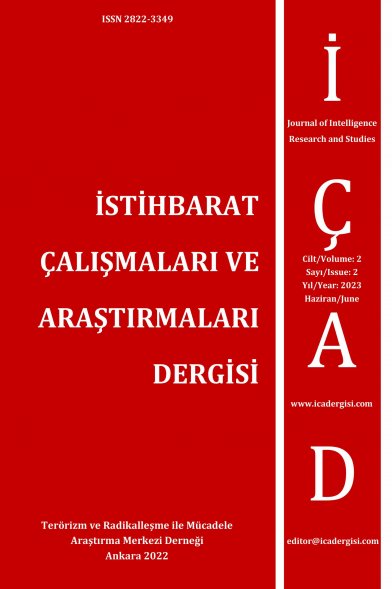Yüksek Öğretimde İstihbarat Çalışmaları Öğretimi: Modeller, Örnekler, Müfredatlar
İstihbarat, İstihbarat Öğretimi, Yüksek Öğretim, İstihbarat Çalışmaları, İstihbarat Topluluğu.
Intelligence Studies in Higher Education: Models, Cases, Cirruculas
Intelligence, Intelligemce Education, Higher Education, Intelligence Studies, Intelligence Community. ,
___
Andrew, C. (2004). Intelligence, ınternational relations and 'undertheorisation', Intelligence and National Security, 19:2, ss.170-184
Arcos, R. (2013). Academics as strategic stakeholders of ıntelligence organizations: a view from Spain, International Journal of Intelligence and CounterIntelligence, 26:2, ss.332-346
Caligiuri, M. ve Pili, G. (2021). Italian ıntelligence studies literature- understanding the state of play- a comparative perspective, The International Journal of Intelligence, Security, and Public Affairs, 23:3, ss.281-309
Campbell, S. H. (2011). A survey of the U.S. market for ıntelligence education. International Journal of Intelligence and CounterIntelligence, ss.24:2, 307-337
Corvaja, A.S., Jeraj B. ve Borghoff U.M. (2016). The rise of ıntelligence studies: a model for Germany? Connections 15:1, ss.79-106
Cristescu, C. (2011). Intelligence studies in higher education. Designing an intelligence studies curriculum for the Romanian civilian universities. The Online Journal Of New Horizons In Education. 1:1, ss.1-10
Crosston, M. (2013). Occam’s follies: Real and ımagined biases facing ıntelligence studies. Journal of Strategic Security, 6:3, ss.40-53.
Derian, J. (1992). Antidiplomacy: spies, terror, speed and war. Blackwell Yayınları
Fry, M.G. ve Hochstein, M. (2005). Epistemic communities: ıntelligence studies and ınternational relations, (Ed.) Wesley W. Espionage: past, present, future?
Frank Cass Gill, P., Marrin, S. ve Phythian, M. (Eds.). (2008). Intelligence theory: key questions and debates. Routledge.
Glees, A. (2015). Intelligence studies, universities and security. British Journal of Educational Studies, 63:3, ss.281-310
Goodman M.S. (2006). Studying and teaching about ıntelligence: The approach in the United Kingdom intelligence education. Studies in Intelligence 50: 2, ss.57-66
Goodman M.S. ve Omand D. (2008). What analysts need to understand: The King’s Intelligence studies program. Studies in Intelligence. 52:4, ss.1-12.
Hulnick, A.S. (1991). Learning about U.S. intelligence: Difficult but not impossible. International Journal of Intelligence and CounterIntelligence, 5:1, ss.89–99.
Johnson, L.K. ve Shelton, A. M. (2013). Thoughts on the state of ıntelligence studies: A survey report, Intelligence and National Security, 28:1, ss.109-120.
Joint Military Intelligence College. (1999). A flourishing craft: teachıng intelligence studies, Conference on Teaching Intelligence Studies at Colleges and Universities.
Kubovich Y. (2019). Hebrew University to Host Israeli Army Base on Campus, Haaretz, Erişim tarihi: 14 Nisan 2023, https://www.haaretz.com/israel-news/2019-04-14/tyarticle/.premium/hebrew-university-to-host-israeli-army-base-oncampus/0000017f-dbe6-d856-a37f-ffe6bf330000
Lomas, D.W.B. (2021). Party politics and intelligence: the labour party, British intelligence and oversight, 1979-1994, Intelligence and National Security, 36:3, ss.410-430,
Marrin, S. (2012). Intelligence studies centers: making scholarship on ıntelligence analysis useful. Intelligence and National Security, 27:3, ss.398–422.
Marrin, S. (2014). Improving ıntelligence studies as an academic discipline, Intelligence and National Security, 31:2, ss.266-279.
Michael, K. ve Kornbluth, A. (2019). The academization of ıntelligence, Cyber Intelligence, and Security 3:1, ss.117-140
Moran, C. R. (2011). The pursuit of intelligence history: Methods, sources, and trajectories in the United Kingdom. Studies in intelligence, 55:2, ss.33-55.
Murray, M.L. (2013). Building an International and comparative view of academic ıntelligence education: a look at graduate programs in Indonesia, South Africa, India, Israel, and South Korea. American Intelligence Journal, 31:2, ss.12-22
Ovaida, S.K. (2019). Hebrew University President Rebuts Critics: Army Ties Won’t Change Academic Life on Campus, Haaretz, Erişim tarihi: 17 Nisan 2023, https://www.haaretz.com/israel-news/2019-04-17/tyarticle/.premium/hebrew-university-president-rebuts-critics-amy-tieswont-change-academic-life/0000017f-f7e9-d318-afff-f7ebfe410000
Pascovich, E. (2017). Security and ıntelligence studies in Israel, The International Journal of Intelligence, Security, and Public Affairs, 19:2, ss.134-148.
Phythian, M. (2008). Intelligence theory and theories of international relations: Shared world or separate worlds? Intelligence theory içinde (ss. 68-86). Routledge.
Rudner, M. (2008). Intelligence studies in higher education: capacitybuilding to meet societal demand. International Journal of Intelligence and CounterIntelligence, 22:1, ss.110–130.
Scott, L. (2007). Sources and methods in the study of intelligence: A British view, Intelligence and National Security, 22:2, ss.185-205,
Scott, L. ve Jackson P. (2004). The study of ıntelligence in theory and practice, Intelligence & National Security, 19:2, ss.139-169,
Stafford T. T. (1988). Assessing current intelligence studies, International Journal of Intelligence and CounterIntelligence, 2:2, ss.217-244
William C. S. (2009). National security ıntelligence professional education: a map of U.S. civilian university programs and competencies, George Washington University.
- ISSN: 2822-3349
- Yayın Aralığı: Yılda 2 Sayı
- Başlangıç: Haziran 2022
- Yayıncı: Terörizm ve Radikalleşme ile Mücadele Araştırma Merkezi Derneği
Terör Örgütlerinin İstihbarat Yöntemleri: El Kaide, IRA/PIRA Örnek Olay İncelemesi
Çağatay BALCI ve Erol Başaran BURAL
Merve SEREN ve Namık Kemal YILDIZ
İstihbarat ve Terörizmle Mücadelede Radikalleşmeden Dönüş
Doç.Dr. Ali Burak DARICILI ile Söyleşi: İstihbarat 101
Yüksek Öğretimde İstihbarat Çalışmaları Öğretimi: Modeller, Örnekler, Müfredatlar
Dış Politikada İstihbaratın Önemi ve Etkileri: ABD ve 2003 Irak Savaşı Örneği
Kitap İncelemesi / Casusu Yakalamak: Karşı İstihbarat Sanatı
